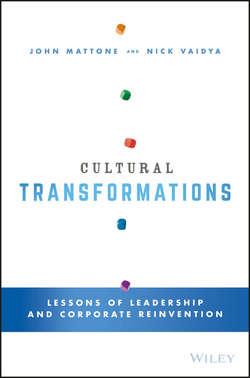Читать книгу Cultural Transformations - Mattone John - Страница 8
На сайте Литреса книга снята с продажи.
Introduction
The Transformation Imperative
ОглавлениеChange Is the New Normal
In today's business world, the rate of change is at an all-time high. Rapid digitization and globalization the likes of which we've never seen before are transforming the face of global business and making the competitive environment far more unpredictable than it was even a decade ago. From smartphones to virtual marketplaces, new technologies are changing consumer behavior, empowering start-ups, and reducing product life cycles. And with the growth in emerging economies like India and Brazil outpacing growth in developed countries, companies are being forced to develop unique strategies for each sector. Within this changing landscape traditional operating models are becoming obsolete and the once-dominant players are increasingly being overtaken by more agile, entrepreneurial companies with business models that are built on change.
In this brave new world, transformation has become an imperative for companies to succeed. In the past, transformation efforts were perceived as emergency solutions to broad and systemic problems. But transformation efforts today have become a basic necessity to keep up with and stay ahead of the ever-changing marketplace. In fact, fewer than 50 percent of the organizations we have worked with directly, including those featured in this book, have been forced to transform due to chronic underperformance. The most forward-thinking companies are launching preemptive transformations, retooling themselves to stay ahead of their competitors.
Culture and Leadership: The Keys to Transformation
Despite the growing popularity of transformation in the business world, the reality is that most transformation efforts fail. Evidence from global companies undergoing transformations from 2003 through 2015 shows that up to 75 percent fell short of their targets. Only 25 percent were able to capture short-term and long-term performance gains compared with their sector average.
Why is transformation so difficult? In our extensive research across a wide variety of industries, we've found that the two key macro levers that make or break transformation efforts are culture and leadership. When we talk about transforming culture, which we'll explore in Chapter 1, we mean shifting the key values and principles that define corporate cultures into ones that embrace rather than resist change. By leadership, which will be the focus of Chapter 2, we mean finding and developing the right leaders at all levels of the organization who are able to embody and instill these cultural values so they can successfully guide their employees, teams, and organizations through the transformation process. We've found that mastering these two macro levers ultimately determines the success of any transformation effort. The centerpiece of Chapter 2 is our Six-Step Model of Cultural Transformation, which provides a powerful road map for achieving sustained success with any transformation effort by focusing on the micro levers of vision, humility, communication, leadership at all levels, talent, and measurement. These micro levers, if pushed with passion, perseverance, and precision, are the keys to mastering the leadership and culture macro levers which, as we said earlier, are the critical foundation steps to ensuring sustained success with any transformation initiative.
Conversations with 14 Transformational Leaders
In our conversations with business people from around the world, one of the most common things we hear is that there isn't enough mentorship for aspiring leaders today. In fact, the “leadership gap” is one of the biggest challenges facing companies worldwide. This is a big reason we chose to write this book. We wanted to give you unprecedented access to some of today's most successful business minds and ask them the big questions about success, leadership, corporate culture, and the future of business. Through the following interviews, you'll get to hear from 14 CEOs who have each, in their own way, exemplified transformational leadership within their own companies.
There's the story of Kathy Mazzarella, who started working for Graybar without a college degree and rose through the ranks to become the first female CEO in the company's history. You'll hear from Kris Canekeratne, a Sri Lankan native who instilled a commitment to perpetual improvement into the core business culture of Virtusa from the beginning, allowing the company to survive several evolutions in the tech sector and remain one of the top companies in the world for two decades. There's a conversation with Hap Klopp, who started his company with a group of fellow outdoor enthusiasts and, thanks to an uncompromising commitment to creating products that they love, grew The North Face into the world's most respected outdoor equipment company. And you'll learn how Eddie Machaalani built Bigcommerce on a foundation of hard-working family values that he learned growing up in the Lebanese immigrant community in Sydney, Australia.
Each of these CEOs brings a unique perspective to bear on leadership and cultural transformation. But they all share an uncompromising belief that culture starts from the top and that the success or failure of any company depends on the integrity and vision of its leader. We feel honored to have spoken to such a talented and diverse group of leaders, and hope that by hearing their stories, you'll be better equipped to engage in and lead transformation efforts within your own company.
But before we dive into the interviews, we'd like to talk more in depth about both cultural transformation and leadership, which we'll do in Chapters 1 and 2.
